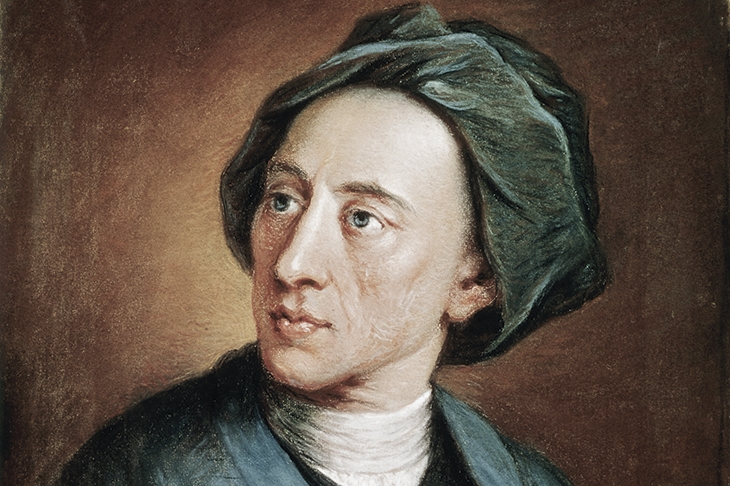Rapid technological advance, a dark underworld of uncensored publishing, a threatened rupture with Scotland, even fears of a new outbreak of plague. Close scrutiny of the first few decades of the 18th century reveals some startling (and oddly reassuring) parallels with our own trying times. In his new book, Pat Rogers, an expert on the writings of Alexander Pope and much else, resurrects what you might think was an obscure battle over copyright between Pope and the Grub Street bookseller and printer Edmund Curll. Their quarrel, though, becomes a prism through which Rogers captures the upheavals, hubbub and stench but, above all, the wit of that period, when words could have the explosive impact of hand grenades.
Pope was the most financially successful author of his time, largely through his translations of Homer, but also because of his brilliant poetic satires such as The Rape of the Lock (1712) and The Dunciad (1728). But he was a Catholic at a time when all Catholics were under suspicion (and legislated against for their religion) after repeated Jacobite attempts to reinstate the Stuart monarchy. He was friends with Jonathan Swift and John Gay; portrayed by the society painters Godfrey Kneller and Michael Dahl; infamously irritable, and an easy target for caricature because illness in childhood had left him with a hunched back and disabilities that worsened with age.
Curll was famous for his readiness to ascribe works to authors who had never written a word of them
Curll was brash, extrovert, salacious and quarrelsome. A keen supporter of the Whig (and Protestant) government of Robert Walpole, he was described as ‘a nuisance to mankind’ by Swift and ‘an ugly, squinting old fellow’ by Laetitia Pilkington. (Rogers ensures that women make frequent, and often surprising, appearances as writers and printers.) As a bookseller and publisher, Curll was renowned for his ‘Bawdy Books’ (often veering on pornography), his unabashed willingness to ascribe works to authors who had never written a word of them and his readiness to go to any lengths to make a book sell.
Their quarrel has its source in the rebellion of 1715, when the Catholic Pretender’s army got as far as Preston in Lancashire before being overwhelmed. Some of those involved were executed at the Tower. Curll, ever eager to capitalise on a situation, noted that a number of those who had subscribed to Pope’s translation of the Iliad were supporters of the rebellious Stuart cause. These connections had the potential to undermine Pope’s career as a writer in these years of political uncertainty. Curll seized his opportunity. On 26 March 1716 he published Court Poems, partly authored, he claimed, by the ‘judicious translator of Homer’. Pope had in fact written none of them.
Incensed by Curll’s cheek, Pope claimed to have laced a glass of sack (Spanish white wine) with a poisonous emetic, provoking the hapless printer to vomit vast quantities of noxious bile. Within a few days Pope then published a comic satire, ‘A Full and True Account of a Horrid and Barbarous Revenge by Poison, on the body of Edmund Curll, Bookseller’, detailing Curll’s discomfiture.
Pope’s mistake was to play Curll at his own game, using fake identities to tempt Curll to publish his letters without permission. He also annoyed his colleagues when in The Dunciad he went to war with those ‘dunces’, or hack writers, who habituated Grub Street as hired pens, claiming that they write without believing in what they write, and solely for the advantage of the highest rates. Curll appeared throughout, asking for help in one of the mock-Homeric races from Cloacina, the goddess of the sewers, and taking part in a pissing competition.
Just ten days after The Dunciad was published, Curll rushed into print his riposte, A Compleat Key to the Dunciad, providing his own detailed glosses to references in the text. The Popiad followed shortly after, describing how Pope was assaulted near his home in Twickenham by two people, bringing ‘this Man to the Lash, whose wanton Wit has been the lashing of others’. By the mid-1730s Curll was emboldened enough to print a detailed plan of Pope’s house and garden in Twickenham as if it were an official guide to the property. He also began a series of volumes that purported to be Pope’s correspondence.
Finally, in the summer of 1741, Curll was brought to court by Pope, accused of publishing his personal letters without permission, the first such case to test the 1710 Copyright Act. Curll tried to argue that those letters sent to Pope could not be considered his property, and in any case letters were not protected by the Act. The Lord Chancellor ruled against him.
Rogers presents his narrative as if it were a court case, assembling the evidence as written statements, weighing up the pros and cons. He refrains from passing judgment, asking us to be the jurors. Secretly, though, one suspects that he admires both men: Pope for his ability to conjure up in The Rape of the Lock ‘something miraculously delicate, refined and subtle out of a tissue of silly nonsense’; Curll for his chutzpah, his commercial savvy, his resourcefulness and his attentive reading of Pope, knowing precisely where to aim his verbal grenades. His book serves as a monument to them both, a literary delicacy in the spirit of Pope, dashed with more than a little of Curll’s sauce.






Comments